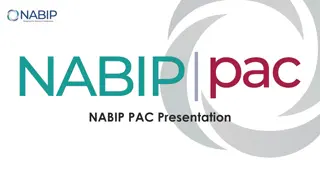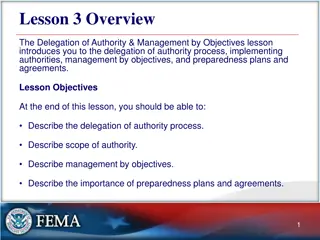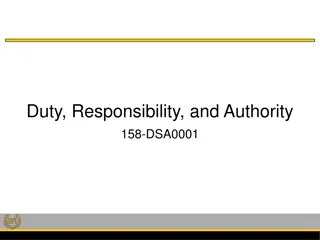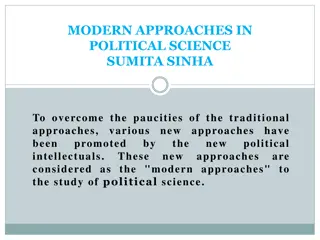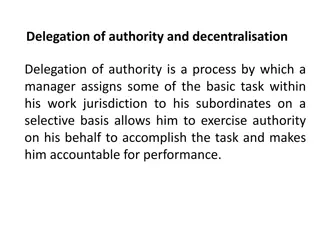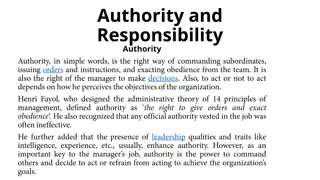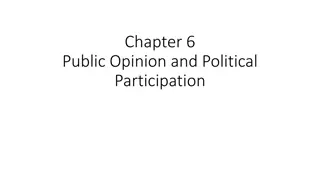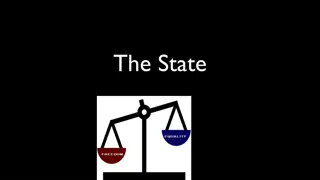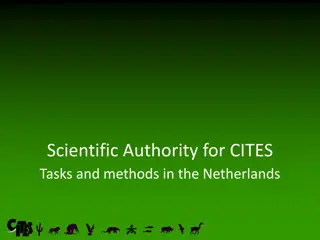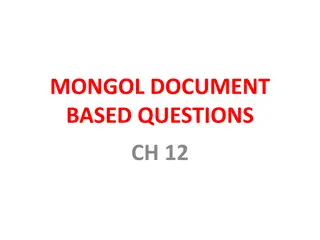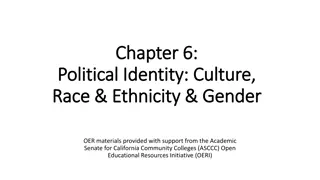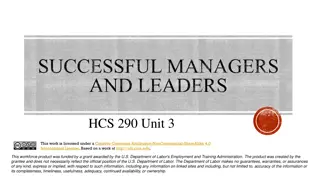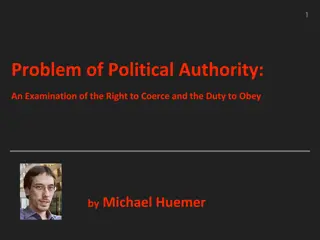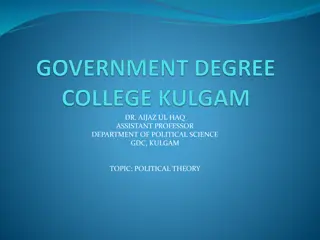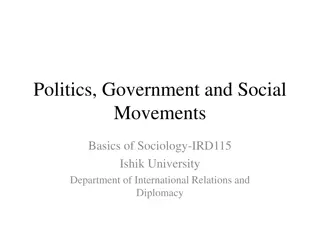Understanding NABIP PAC: Political Action Committee Overview
Federal law prohibits direct financial contributions to federal candidates, hence organizations like NABIP establish Political Action Committees (PAC) to advocate for political priorities. Learn about NABIP PAC, its accounts, eligibility criteria, contribution rules, and how funds are utilized. Disc
1 views • 14 slides
Contrasting Concepts in Political Science: Normative vs Descriptive Approaches
Normative and descriptive concepts in Political Science explore contrasting viewpoints on how things should be versus how they actually are. While normative claims focus on value judgments, descriptive claims deal with facts. These concepts complement each other by providing both theoretical and pra
0 views • 10 slides
Understanding Delegation of Authority and Management by Objectives
The lesson on delegation of authority and management by objectives covers the process of delegating authority, implementing authorities, management by objectives, and the importance of preparedness plans and agreements. It discusses the authority having jurisdiction, scope of authority, and the dele
1 views • 31 slides
Understanding Duties, Responsibilities, and Authority in the Military
Explore the roles of noncommissioned officers (NCOs) in the military, focusing on duties, responsibilities, and authority. Understand the types of duties, including directed, implied, and specified. Delve into the different forms of responsibility such as command and individual responsibility. Learn
8 views • 10 slides
Five Dimensions to Our Spiritual Authority
Explore the five dimensions of spiritual authority - Redemptive, Inherited, Positional, Delegated, and Empowered authority - outlined in the context of Christ's triumph and our identity as children and heirs of God. Scriptures from Romans 8:16-17 and Galatians 4:6-7 emphasize our position as joint h
0 views • 20 slides
Modern Approaches in Political Science: Overview and Characteristics
Explore modern approaches in political science pioneered by intellectuals to address the limitations of traditional methods. These approaches emphasize empirical data, interdisciplinary study, and scientific methods to draw conclusions beyond political structures and historical analysis. Key modern
1 views • 13 slides
Understanding Delegation of Authority in Management
Delegation of authority in management is a crucial process where managers assign tasks to subordinates, allowing them to exercise authority on their behalf. Louis A. Allen defined authority as the rights entrusted to a position holder to enable task performance. Effective delegation involves element
0 views • 13 slides
Understanding Authority and Responsibility in Organizational Dynamics
Authority and responsibility are key elements in organizational structures. Authority represents the legal right of a superior to command subordinates, often delegated down the hierarchy. Responsibility, on the other hand, is the obligation of a subordinate to perform assigned tasks without delegati
0 views • 5 slides
Interdisciplinary Approach in Political Science and Its Relation with History
The need for an interdisciplinary approach in political science emerged in the 20th century to study political issues from various social science perspectives. This approach emphasizes the interrelation between political science and other disciplines like history. History provides the foundation for
0 views • 23 slides
Institutionalism and Methodological Issues in Political Science
Institutionalism is a foundational concept in political science, emphasizing the study of governing institutions and their role in shaping political behavior. It explores inductive and deductive approaches to research, highlighting the significance of empirical evidence and theoretical assumptions.
0 views • 19 slides
State-Sponsored Interreligious Dialogue in the Middle East: A Political Analysis
This research delves into the growth of state-sponsored interreligious dialogue initiatives in the Middle East between 2000-2020. It explores the political significance, impact on relations between political and religious authorities, and implications for religious practices in the region. The thesi
0 views • 23 slides
Understanding Gramsci's Political Theory and its Relevance Today
Gramsci's political theory, focusing on concepts such as hegemony, historical bloc, and the role of intellectuals, offers valuable insights into contemporary political challenges. Explored through the lenses of Prof. Ken Spours and Stuart Hall's analytical tradition, this analysis sheds light on Con
0 views • 13 slides
Evolution of Citizenship in Liberal Democracy
Citizenship within liberal democracy entails equal rights, duties, liberties, and constraints for individuals within a political community. The entrenchment of civil and political rights has shaped the struggle for membership and participation in political communities. Civil rights, essential for in
1 views • 11 slides
Dimensions of Spiritual Authority: Five Empowering Realms in Christ
Explore the five dimensions of spiritual authority rooted in Christ's triumph, our identity as sons and daughters of God, our authority in Christ, the delegated authority as Christ's representatives, and the empowered authority through the anointing. Delve into how Jesus ministered under the anointi
0 views • 25 slides
Understanding Political Theory through a Contextual Approach
Exploring G.H. Sabine's perspective on political theory through a contextual approach, emphasizing the importance of historical context and societal influences. Sabine argues that while political theory evolves with its contemporary politics, it should be analyzed within its specific time and social
0 views • 9 slides
Understanding Public Opinion and Political Participation
Public opinion and political participation are influenced by various factors such as financial interests, family, education, and party identification. Measuring public opinion accurately through scientific surveys is crucial in a democracy. Traditional participation methods like voting and civic vol
5 views • 7 slides
Analysis of Facebook Affordances for Political Parties During the 2014 EU Elections
Research by Karolina Koc-Michalska and Darren Lilleker explores how political parties across 28 countries utilized Facebook affordances during the 2014 European Parliament elections. The study investigates the impact of social media on voter behavior, community building, and political engagement. Fi
0 views • 22 slides
Understanding Political Beliefs and Behaviors: A Comprehensive Overview
Explore the formation, evolution, and transmission of political beliefs, as well as the impact of differing beliefs and behaviors on the political process. Delve into platform issues, political affiliations, and their influences to gain a deeper understanding of the political landscape.
1 views • 53 slides
Understanding Nationalism in Political Science
Nationalism, a complex concept, defines the nation as the fundamental unit of political rule. It encompasses a mix of objective and subjective factors, including cultural, ethnic, and political traits. The definition of a nation is subjective, based on how its members perceive themselves as a distin
0 views • 27 slides
Understanding Political Science: A Comprehensive Overview
The study of political science delves into various aspects, from the pursuit of the good society to the exercise of power and the allocation of resources. It encompasses specialized fields such as American politics, international relations, comparative politics, public policy, and political philosop
0 views • 5 slides
UK Statistics Authority's Role in Ensuring Trustworthy Health and Care Statistics in England
The UK Statistics Authority, established under the Statistics and Registration Service Act 2007, plays a crucial role in promoting the production and publication of high-quality official statistics in the field of health and care. They emphasize the importance of trustworthy, valuable statistics tha
0 views • 9 slides
Exploring Political Philosophy and the State's Authority
Delve into thought-provoking questions on political philosophy, legitimacy of authority, roles of the state, and individual obligations. Reflect on the state's power to enforce laws and restrictions, contrasting it with individual actions. Consider the complexities of governance, revolution justific
0 views • 9 slides
Political Development Theory and Practice: An Overview
Political development refers to the evolution of institutions forming the political power system of a society. Initially popular in the 60s-70s to describe political change, it later fell out of favor for being Euro-centric but has since regained significance. The concept encompasses aspects like po
0 views • 13 slides
Political Party Funding Act 2018 Overview
The Political Party Funding Act of 2018 in South Africa aims to enhance multi-party democracy by regulating the funding and donations to political parties. It establishes the Multi-Party Democracy Fund funded by private sources, alongside the existing Represented Political Party Fund. The Act prohib
0 views • 17 slides
Understanding Political Party Funding Act of 2018
The Political Party Funding Act of 2018 regulates the funding of political parties in South Africa, ensuring equitable and proportional funding for parties participating in national and provincial legislatures. The Act defines various terms such as donations, foreign persons, and political parties,
0 views • 42 slides
CITES Tasks and Methods in the Netherlands - Scientific Authority Overview
The Netherlands has a Scientific Authority for CITES tasks and methods, playing a crucial role in the Convention on International Trade in Endangered Species of Wild Fauna and Flora. This independent body advises the Management Authority and assists in preventing extinction due to international trad
0 views • 30 slides
Evolution of Political Ideas and Influences on American Founding
In the history of politics, major ideas like laws of nature, unalienable rights, divine right of kings, social contract theory, and rights of resistance have influenced the American founding. Various traditions such as Judeo-Christian, English common law, Enlightenment, and republicanism played a si
0 views • 68 slides
Awakening to Spiritual Authority in Christ
Christians often overlook their true identity and authority in Christ, hindering their ability to wield spiritual authority effectively. The ignorance within the Church has allowed Satan to thrive. It is crucial for believers to awaken to the reality of spiritual warfare, comprehend the disparity be
0 views • 24 slides
Insights into Mongol History: Political Relationships and Achievements
Explore the dynamics of political authority and relationships among the Mongols through the Anda relationship, personal authority, and ritual exchanges. Discover Ogodei's greatest achievements and notable mistakes as well as Chinggis Khan's aspirations and self-image in shaping the Mongol empire. Un
0 views • 20 slides
Explore the Fascinating World of Political Science
The Department of Political Science offers a range of courses, delving into topics such as political theory, international relations, and governance. Understand the distinction between politicians and political scientists, and explore branches of political science like public administration and huma
0 views • 16 slides
Understanding Political Identity: Culture, Race & Gender in Society
Explore the intricate aspects of political identity, culture, race, ethnicity, and gender in society. Discover how individuals shape their identities and the impact of political mobilization on society. Uncover the significance of political socialization and the role of societal institutions in shap
0 views • 20 slides
Essential Concepts in Leadership and Authority in Healthcare
Effective leaders and managers play a crucial role in healthcare and health information technology projects. Leadership using authority, power, and expert knowledge are key components in ensuring successful management and outcomes in healthcare organizations. Authority in the C-Suite, power to influ
1 views • 28 slides
Exploring Political Authority: Right to Coerce and Duty to Obey
This presentation delves into the concepts of political authority, legitimacy, and obligation, examining the right to rule and the duty of citizens to obey their government. It contrasts vigilante scenarios to government actions, discusses social contract theories, differentiating explicit and impli
0 views • 21 slides
Evolution of Political Protests in Modern Russia: A Historical Overview
This article provides an in-depth analysis of the evolution of political protests in modern Russia from 1990 to present. It discusses the attitude of Russian journalists towards protests, basic concepts of political protest in modern political science, myths surrounding protests in Russia, and the f
0 views • 24 slides
Impact of Political Stability on Equity Trading Costs of Cross-Listed Firms
The research explores the relationship between political stability and equity trading costs of cross-listed firms, highlighting the impact of political institutions, liquidity, and investor protection. It delves into the importance of factors like quality of political institutions, transparency, and
0 views • 24 slides
Interdisciplinary Relationships in Political Science
Political science and history share a symbiotic relationship, with history providing the foundation for political analysis while political science influences historical events. The contribution of economics to political science is evident in how economic conditions shape political ideologies and pol
0 views • 12 slides
Understanding Political Theory: Definitions, Differences, and Significance
Political theory encompasses systematic explanations of political phenomena, distinct from political thought which involves ideas and opinions of philosophers. It constitutes both political science and philosophy, addressing both empirical and evaluative aspects. The significance lies in finding sol
0 views • 7 slides
Remedial Measures Implemented by Indian Political Party
Explore the impactful remedial measures taken by a prominent political party in India through a collage presentation. Delve into the functions of political parties, understanding partisanship, the necessity of political parties, and more. Gain insights into the significance and role of political par
0 views • 23 slides
Insights on Authority and Wisdom in Life
Exploring the concepts of wisdom, authority, and righteousness through a biblical lens, this collection of images and verses prompts reflection on one's approach to authority and decision-making. It emphasizes listening to the right voices, leveraging authority for just actions, and the importance o
0 views • 38 slides
Understanding Politics, Power, and Authority: Basics of Sociology
Politics encompasses the use of power to influence government activities, extending beyond to organizations and social movements. Power, as defined by Max Weber, refers to the realization of one's will despite resistance. Authority signifies accepted power that people agree to follow, often linked w
0 views • 22 slides
